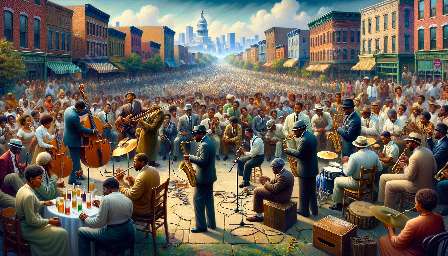When delving into the rich history and culture of music, few genres hold the same level of significance as jazz and blues. These two distinct forms of musical expression have played a pivotal role in shaping American identity through their unique features and contributions. This comprehensive topic cluster explores the distinctive traits of jazz and blues, their impact on American culture, and their enduring influence. From the rhythmic complexities of jazz to the emotional depth of blues, each genre has contributed significantly to the tapestry of American identity.
Distinctive Features of Jazz and Blues
Jazz and blues are both deeply rooted in the African American experience, drawing from a complex blend of musical traditions, cultural influences, and historical contexts. The distinctive features that set these genres apart have contributed to their enduring appeal and cultural resonance.
Jazz
Jazz is characterized by its improvisational nature, intricate harmonies, syncopated rhythms, and individual expression. Its origins can be traced back to the late 19th and early 20th centuries, emerging from the African American communities of New Orleans and evolving into a diverse and dynamic musical genre. The innovative use of instruments, unconventional chord progressions, and complex rhythmic patterns are hallmarks of jazz, allowing musicians to engage in spirited dialogue and creative exploration during performances.
Blues
Rooted in the pain and resilience of the African American experience, blues music is distinguished by its soulful melodies, expressive vocals, and raw emotional power. The blues emerged as a means of catharsis and storytelling, reflecting the hardships and joys of everyday life. With its distinct 12-bar chord progression and deeply personal lyrics, the blues has resonated with audiences worldwide, serving as a foundational influence for countless musical traditions.
The Impact of Jazz and Blues on American Identity
The contributions of jazz and blues to American identity are multifaceted, encompassing social, cultural, and artistic dimensions. These genres have served as vehicles for social change, artistic innovation, and cultural exchange, leaving an indelible mark on the fabric of American society.
Social and Cultural Impact
Jazz and blues music have provided a platform for marginalized voices, serving as a powerful means of expression for African American communities. The themes of resilience, struggle, and triumph embedded in the music have resonated with diverse audiences, fostering a greater understanding of the African American experience and contributing to the ongoing dialogue on race, equality, and social justice.
Artistic Innovation
The creative spirit of jazz and blues has sparked new avenues of artistic exploration and experimentation. From the groundbreaking innovations of jazz legends like Louis Armstrong, Duke Ellington, and Miles Davis to the soul-stirring performances of blues icons such as B.B. King and Ma Rainey, these genres have pushed the boundaries of musical expression, redefining the possibilities of sound and performance.
Cultural Exchange
Jazz and blues music have transcended geographical and cultural boundaries, serving as cultural ambassadors for American music on the global stage. The international appeal of jazz and blues has facilitated cross-cultural exchanges, fostering a sense of interconnectedness and mutual appreciation among diverse communities around the world.
The Enduring Influence of Jazz and Blues
While jazz and blues have evolved over time, their enduring influence on American identity remains palpable. These genres continue to inspire new generations of musicians, shape artistic movements, and provide a lens through which to examine the complexities of American society.
Musical Evolution
The influence of jazz and blues can be heard in a wide array of musical styles, from rock and hip-hop to contemporary R&B and pop. Their DNA is woven into the fabric of American popular music, serving as a source of inspiration for countless artists seeking to pay homage to the traditions of jazz and blues while pushing the boundaries of sonic innovation.
Critical Reflection
Through the lens of jazz and blues, American identity has been critically examined, challenged, and redefined. These genres have provided a mirror to societal issues, serving as a means of introspection and cultural critique. From compelling narratives of resilience to poignant reflections on the human experience, jazz and blues have provided a nuanced backdrop for exploring the multifaceted nature of American identity.
Conclusion
The contributions of jazz and blues to American identity are far-reaching, encompassing artistic, social, and cultural dimensions. As integral components of the American musical landscape, jazz and blues continue to resonate with audiences worldwide, reflecting the diverse tapestry of experiences that comprise American identity.






























